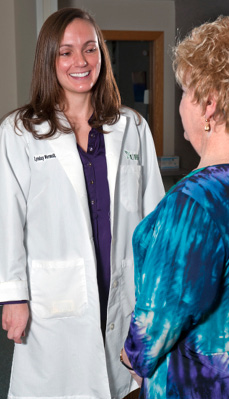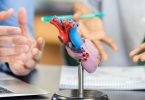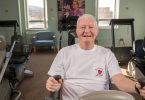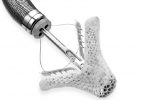Joyce Thomas, 67, loves a good movie—something with a handsome leading man and maybe a complex plot that takes its time to unwind. When it comes to her health, however, she wants matters handled quickly and by a cast of medical experts who get right to the point. So after Ms. Thomas was diagnosed with atrial fibrillation and her cardiologist prescribed the anticoagulant drug warfarin (commonly known by its brand name, Coumadin) to decrease her risk of heart attack, stroke and blood clots, she was not happy about the requisite blood draws to test her clotting levels. As she describes, the appointments took too much time, too much blood and entirely too much waiting around for lab results.
When the UHS Anticoagulation Clinic opened in October 2012, now conveniently located at UHS Vestal, Ms. Thomas was among the first patients to make an appointment. Her review after the clinic’s premiere? Four stars! “My levels are checked with just a finger stick, the results are immediate and I get so much personal attention,” Ms. Thomas explains. “I’m not always the best patient. But when something is this simple and everyone is so personable, it’s very easy to follow through.”
The personal attention is by plan, explains Jacob Thompson, PharmD, MS, associate director of Pharmacy. “Testing blood levels during a doctor’s visit gives the physician about 15 minutes for a full diagnostic assessment—physiologically and medically. At the clinic, the entire appointment is dedicated solely to your anticoagulation medication. There’s time for education, questions and open communication about any issues or concerns.”
DOCTOR-APPROVED
PHONE IT IN
When Lyndsay Wormuth, PharmD, ambulatory care clinical pharmacy specialist at the UHS Anticoagulation Clinic, consults with a new patient, she’s quick to stress that the communication lines are open. “I want patients to feel good about calling the clinic with concerns or questions, so we can take care of things right away,” she says.
Here are Dr. Wormuth’s top reasons to call the clinic:
- You begin or stop taking a medication, including over-the-counter drugs or vitamin supplements. Some medications weaken or strengthen an anticoagulant’s effect.
- You are trying to become pregnant or are pregnant. Anticoagulants can increase risk of birth defects.
- You are scheduled for surgery or dental work. Anticoagulants can increase bleeding, so your dosage may need to be temporarily adjusted. Also, be sure to tell your doctor or dentist that you take an anticoagulant.
- You significantly alter your diet. Some foods, particularly those high in vitamin K, can decrease an anticoagulant’s effects. You also want to discuss increased alcohol drinking.
- You notice more bruises than usual, which may signal a need for a dosage adjustment.
In case of an emergency, Dr. Wormuth also urges her patients to carry a medical ID card with their name, phone number, address and medication name, as well as the UHS Anticoagulant Clinic’s contact information.
In 2008, The Joint Commission, the preeminent accrediting body for healthcare facilities, added a new requirement to its National Patient Safety Goals: An organization should reduce the likelihood of patient harm associated with the use of anticoagulation therapy. The stipulation was designed to decrease known dangers associated with these high-risk drugs—risks that increase without proper and ongoing therapy management. For example, if a patient’s anticoagulation dosage is too high, there’s increased risk of severe bleeding. If too low, there’s risk of developing a clot, which in turn increases risk for stroke, deep vein thrombosis, pulmonary embolism and other serious conditions.
As an accredited hospital with The Joint Commission’s Gold Seal of Approval, UHS Wilson Medical Center promptly initiated an inpatient program to increase safety and effective use of anticoagulation medication. Highly specialized pharmacists assumed responsibility for managing inpatients’ blood tests, dosage adjustments, patient education and communication with physicians.
“Eventually, our doctors, as well as our patients, asked us to expand with an outpatient setting,” Dr. Thompson says. “We had strong data supporting the fact that our pharmacists were best skilled and trained to manage anticoagulation therapy—because they know the drugs. We suspected that opening the clinic would further advance outpatient care as well. Today the clinic is less than a year old, and already the data surpasses our predictions.”
IMPROVING THE SYSTEM
Mirroring its inpatient system, UHS staffed the outpatient clinic with specially qualified and trained pharmacists who focus solely on each individual patient’s anticoagulation needs while also eliminating the typically long waiting times for results and dosage adjustments. “By specially qualified, we mean pharmacists experienced in clinical settings, or in my case, a doctor of pharmacy with a specialized residency,” says Lyndsay Wormuth, PharmD, ambulatory care clinical pharmacy specialist at the UHS Anticoagulation Clinic.

Joyce Thomas meets with pharmacist Lyndsay Wormuth in the Anticoagulation Clinic.
“In our scenario, I’m qualified to perform the test, get the results and change the dose or write a prescription. It all happens right here—with no waiting,” Dr. Wormuth says.
While efficiency, speed and convenience are benefits that patients highly value, Dr. Wormuth stresses that the clinic’s mission goes further. “Anticoagulants come with significant risks if not carefully monitored. Monitoring includes blood tests and also time to talk with a patient and hear about lifestyle changes.”
Dr. Wormuth wants to hear about a patient’s new or altered prescription therapy, since many drugs, like antibiotics, affect a patient’s anticoagulant dosage. She’s also looking for diet changes. “Let’s say you’re on a new diet and eating more leafy green vegetables. These foods are high in vitamin K, which the body uses to help clot blood—essentially the opposite of what we’re trying to do with anticoagulants. When I hear about these kinds of changes, I know how to adjust medication.”
All this open communication includes quick access to Dr. Wormuth via phone, should a question or issue pop up. As Ms. Thomas explains, “At first I saw or talked with Dr. Wormuth almost weekly, because my levels were out of whack. She knew what to do and got me to that magic number. Now I only see her monthly, but if something does come up, it’s a good feeling to know that Dr. Wormuth is only a phone call away.”
FREE FLOWING
To make an appointment at the UHS Anticoagulation Clinic, call 763-6494. Pharmacists at the clinic will work with your doctor to get you to the right levels. Read more about the delicate balance anticoagulation therapy requires in this web exclusive.







